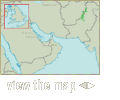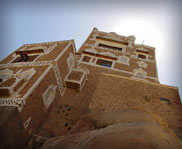|
+ "The Wedding Party" 27 September, Sana'a
from Marcela Gaviria 
 Wherever you are in the Middle East, you can set your clock by the call to prayer. There is Fajr at 5:00 a.m., Thuhr at 12:30 p.m., Asr at 2:30 p.m., Maghrib at 5:30 p.m., and Isha at 7:30 p.m. Five times a day one hears the unmistakable call: a brooding chant that reverberates and echoes for minutes, filling every bedroom in a city. Every mosque for miles tunes its loudspeakers and emits the melodic invitation to prayer. Allah Akbhar. Allah Akbhar. "God is Great. There is only one God. And Muhammad is his messenger."
Wherever you are in the Middle East, you can set your clock by the call to prayer. There is Fajr at 5:00 a.m., Thuhr at 12:30 p.m., Asr at 2:30 p.m., Maghrib at 5:30 p.m., and Isha at 7:30 p.m. Five times a day one hears the unmistakable call: a brooding chant that reverberates and echoes for minutes, filling every bedroom in a city. Every mosque for miles tunes its loudspeakers and emits the melodic invitation to prayer. Allah Akbhar. Allah Akbhar. "God is Great. There is only one God. And Muhammad is his messenger."
I am awoken by what I mistake as the call to prayer. I look at my watch to find it is 4:00 a.m. instead of 5:00, and I'm perplexed. It's not time for Fajr. I step out of bed and open a window. I now hear chanting, drumbeats, and the signature pop of kalashnikovs in the darkness.
Later I learn that what I've heard is the tail end of a wedding party. A bride has been carried over to the bridegroom's bed. Guests await outside the bedroom chambers. Once the marriage has been consummated, the white sheets are brought out for all to witness the evidence of the act. If the sheets are bloodied, the sound of kalashnikovs will announce that another virgin has been deflowered. If the sheets are not soiled, perhaps the bride will be given back. If it's a modern family they might be more understanding.
In Sana'a, a well respected wedding party will continue celebrating the marriage into the next day. It is a custom to head toward the cliffs of Wadi Dhahr, a spectacular rock mountain that overlooks a fertile valley, after bride and groom are husband and wife. This only happens on Friday, the holy day.
I arrive at Wadi Dhahr, the most dramatic landscape of our journey, early in the morning. Dozens of jeeps and land cruisers have already parked on the dusty slope leading up to the cliff. At a distance I can spot five wedding parties, each gathered around in a circle, dancing to the rhythm of a desperate drum.
 |  |
 |  |
 |
| An old castle at Wadi Dhahr near Sana'a. (Photo by Martin Smith) |
 |
There are slow dances and fast ones, but only a few men dance, for it is an honor reserved for immediate family members of the bridegroom. They brandish their daggers, or jambiyas, and twirl. Usually one man leads the way and the others stumble to catch up. After a while, they seem to synchronize. Two steps forward, one step back, and turn. One step back, two steps sideways, and twirl. Occasionally they will clash their daggers together as if fencing.
The bridegroom spends his first hours as a married man watching the men dance. He stands at the sidelines, trying not to disturb the crown of flowers over his cap, and making sure his long sword is propped up against his chest. He is surrounded by friends, dressed in their finest mawaz, or kilt-like skirts, and proudly wearing their red and white kaffiahs over their shoulders. All of them have jambiyas, which they carry to display their manhood and to symbolize their status. A jambiya, a dagger with a handle made of ivory, can be a thousand years old, an heirloom passed on from generation to generation. Or, if you are nouveux riche, you can purchase a handsome one by saving for almost two years.
The bride sits on the rocky cliff at some distance from the dancing. She is surrounded by all the female members of her family. You can barely tell which is the bride, given the small school of black abayas that surround her. But if you look closely, one girl will be holding small pink roses in her hand. The first morning as a married woman is spent watching the valley below and peeling hard-boiled eggs.
When the dancing comes to an end, sometimes the wedding party will fire their kalashnikovs into the air to wish the newlyweds a long and happy life together. If there is no firing, I am told, it is a bad omen.
"What kind of a bad omen?" I ask. Khaled, my translator and guide, answers, "The first-born child might be a girl."

< previous dispatch + next dispatch >

|
London
(Aug. 13-14) |
+ Zubaydah Is Dead
13 August, London |
+ Armchair Jihadists
14 August, London |
Gulf of Oman
(Aug. 15-21) |
+ Faces at a Dubai Mall
15 August, Dubai, U.A.E. |
+ HMCS Algonquin
16 August, somewhere in the Gulf of Oman |
+ On Board the Algonquin
17-18 August, somewhere in the Gulf of Oman |
+ Like an Elephant Chasing a Mouse
17-18 August, Gulf of Oman |
+ Dubai to Karachi
20 August |
+ A Firehose of Information
20-21 August, Dubai - Muscat - Chennai |
Pakistan
(Aug. 22-29) |
+ Old Hash
22 August, Islamabad |
+ Nuclear Neighbors
22-23 August, Islamabad |
+ We Believe in God
24 August, Islamabad |
+ Paranoid in Peshawar
27 August, Peshawar |
+ Bombs or Dust Devils
27-28 August, Peshawar |
+ Rumors and Half Truths
28 August, Peshawar |
Pakistan Border Lands
(Aug. 30-Sept. 4) |
+ On the Road to Chitral
30 August, Dir Khas |
+ Prisoners' Dilemma
31 August, Dir |
+ In the Northwest Frontier
30-31 August, Dir |
+ Border Town
2 September, Chitral to Arandu |
+ Don't Go to Timargarha
1-2 September, Drosh to Timargarha |
+ An American Informer
3-4 September, Peshawar |
Pakistan
(Sept. 5-23) |
+ Road to Nowhere
7 September, Islamabad to Faisalabad |
+ Faisal Town
7 September, Faisalabad |
+ Frustrations
9 September, Faisalabad |
+ The Plight of Women
10 September, Faisalabad |
+ A Little Noticed Gun Battle
10-13 September, Lahore-Karachi |
+ The Madrassa
14 September, Akora Khattak |
+ The Next Big Get
20 September, Karachi - Islamabad |
+ A Circle of Trust
21 September, Islamabad |
+ Indomitable
23 September, Islamabad |
Saudi Arabia
(Sept. 24-Oct. 2) |
+ Inside the Kingdom
24-25 September, Riyadh |
+ My Baffling Question
27 September, Unizah-Buraydah |
+ An Obedient Dissident
27 September, Buraydah |
+ An Audience with the Crown Prince
2 October, Riyadh |
Yemen
(Sept. 25-Oct. 10) |
+ Arriving in Yemen
25-26 September, Sana'a |
+ The Wedding Party
27 September, Sana'a |
+ A Talking Drug
28 September, Sana'a |
+ The World's Most Ancient Skyscrapers
3 October, Sana'a |
+ Americans Are Vampires
7 October, Sana'a |
+ Waiting for Rahma
9 October, Sana'a |
|